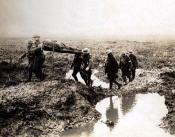I could not understand the sudden quiet
The sudden darkness in the crash of fight,
The din and glare of day quenched in a twinkling
In utter starless night.
I lay an age and idly gazed at nothing,
Half-puzzled that I could not lift my head ;
And then I knew somehow that I was lying
Among the other dead.
The sudden darkness in the crash of fight,
The din and glare of day quenched in a twinkling
In utter starless night.
I lay an age and idly gazed at nothing,
Half-puzzled that I could not lift my head ;
And then I knew somehow that I was lying
Among the other dead.
Contributed by Bartleby - 2010/12/30 - 10:29
×
![]()
Note for non-Italian users: Sorry, though the interface of this website is translated into English, most commentaries and biographies are in Italian and/or in other languages like French, German, Spanish, Russian etc.








Dalla raccolta “Battle”.
Wilfrid Wilson Gibson fu ufficiale di sua maestà, ma non combattè in prima linea e neppure lasciò mai l’Inghilterra. Eppure gran parte delle sue poesie di quel periodo descrivono le atrocità della guerra dal punto di vista del soldato semplice mandato a crepare. Anche dopo la guerra Gibson mantenne nelle sue opere un’attenzione particolare per coloro che, anche in tempo di pace, sono troppo spesso i vinti, i fregati, comunque vada…
Musica di Philip Napier Miles (1865-1935), musicista, compositore e filantropo inglese, dal ciclo per voce e pianoforte intitolato “Battle, Ten Songs” (1917), interamente basato su poesie di Gibson.